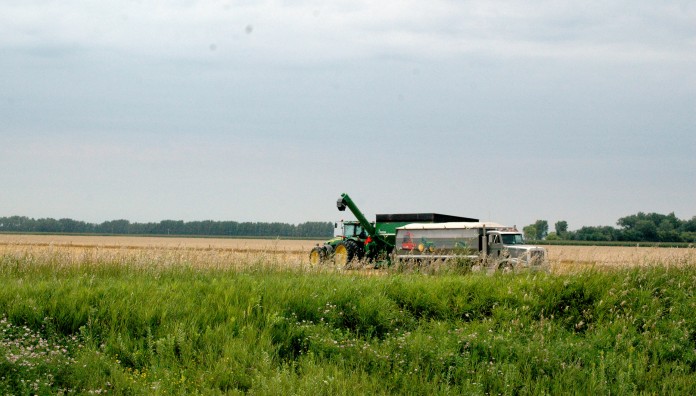Agriculture Secretary Announces $3 Million for a New Program to Improve Pollinator Health
ST PAUL, MINN, Feb. 25, 2014 — USDA’s Natural Resources Conservation Service will provide close to $3 million in technical and financial assistance for interested farmers and ranchers to help improve the health of bees, which play an important role in crop production.
The funding is a focused investment to improve pollinator health and will be targeted in five Midwestern states, Michigan, Minnesota, North Dakota, South Dakota, and Wisconsin.
“Beekeepers in Minnesota are losing unprecedented numbers of honey bee hives each year,” Minnesota State Conservationist Don Baloun said. “Honey bee pollination is estimated to support more than $15 billion worth of agricultural production and commericial production of more than 130 fruits and vegetables that are the foundation of a nutrious diet in the United States. Not only do bees pollinate the crops that produce much of America’s food supply, but they are an important part of the rural ecosystem.”
Funding will be provided through the Environmental Quality Incentives Program (EQIP) to promote conservation practices that will provide honey bees with nutritious pollen and nectar while providing benefits to the environment. Recent studies have shown that beekeepers are losing approximately 30 percent of their honey bee colonies each year, up from historical norms of ten to fifteen percent overwintering losses experienced prior to 2006.
This assistance will provide guidance and support to farmers and ranchers to implement conservation practices that will provide safe and diverse food sources for honey bees. For example, appropriate cover crops or rangeland and pasture management may provide a benefit to producers by reducing erosion, increasing the health of their soil, inhibiting invasive species, providing quality forage and habitat for honey bees and other pollinators, as well as habitat for other wildlife.
Midwestern states were chosen because from June to September the region is the resting ground for over 65 percent of the commercially managed honey bees in the country. It is a critical time when bees require abundant and diverse forage across broad landscapes to build up hive strength for the winter.
Applications are due March 21, 2014.
Since 2006, when heightened numbers of honey bee colony losses were first reported, significant progress has been made in our understanding of the factors that are associated with Colony Collapse Disorder and the overall health of honey bees. The USDA is actively pursuing solutions to the multiple problems affecting honey bee health.
For more information on this program, visit a local USDA service center or the NRCS website.
USDA is an equal opportunity provider and employer. To file a complaint of discrimination, write to USDA, Assistant Secretary for Civil Rights, Office of the Assistant Secretary for Civil Rights, 1400 Independence Avenue, S.W., Stop 9410, Washington, DC 20250-9410, or call toll-free at (866) 632-9992 (English) or (800) 877-8339 (TDD)or (866) 377-8642 (English Federal-relay) or (800) 845-6136 (Spanish Federal-relay).
Contact: Julie A. MacSwain
651-602-7859






















































